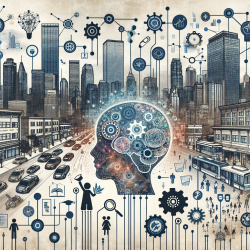Integrating AI for Enhanced Urban Data Accessibility
As a speech-language pathologist, leveraging data-driven insights is crucial for improving outcomes in children. The research article, "Integrative Urban AI to Expand Coverage, Access, and Equity of Urban Data," provides a fascinating exploration of how AI can enhance urban data accessibility and equity. This blog will delve into the key takeaways from the research and how practitioners can implement these insights to improve their practice.
AI's Role in Urban Data
The research highlights four critical areas where AI can significantly impact urban data: interpolation and extrapolation of spatiotemporal data, using NLP techniques for governance activities, exploiting ontology modeling, and understanding fairness and interpretability in sensitive contexts. These areas are pivotal for creating a more comprehensive understanding of urban dynamics.
Applying AI Insights to Practice
For practitioners, especially those in educational settings like TinyEYE, these insights can be transformative:
- Data Interpolation: AI techniques such as image inpainting can be adapted to fill gaps in urban data, similar to how we might address missing data in speech assessments.
- NLP for Governance: By modeling speech-intensive activities, we can better understand and support children's communication needs in various contexts, including governance and decision-making.
- Ontology Modeling: Developing rich ontologies can help categorize and understand complex data, much like creating comprehensive language models for diverse linguistic profiles.
- Fairness and Interpretability: Ensuring AI models are fair and interpretable is crucial, especially when these models influence educational and therapeutic decisions affecting children.
Encouraging Further Research
While the research provides a robust framework, it also opens the door for further exploration. Practitioners are encouraged to delve deeper into how AI can be harnessed to improve educational outcomes, particularly in speech and language development. By engaging with this research, professionals can contribute to a more equitable and effective use of AI in education.
To read the original research paper, please follow this link: Integrative urban AI to expand coverage, access, and equity of urban data.










